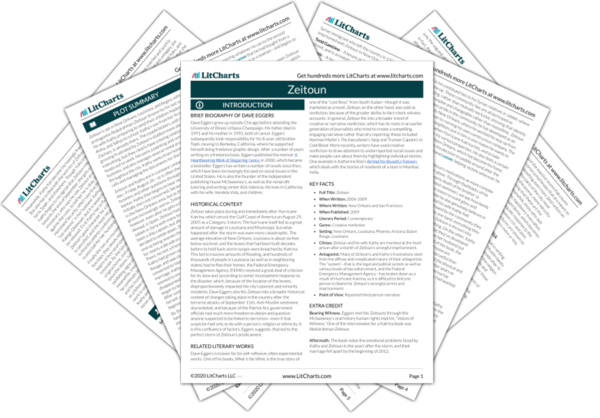A simple, unadorned piece of corrugated iron, the canoe that Zeitoun bought several years before Hurricane Katrina reminds him of where he came from. He was born in a small coastal town in Syria, but also was part of a family of seamen, sailors, and ship captains. This symbol of Zeitoun’s past also becomes a symbol of his stubborn determination to help others in the days after Katrina, as he paddles around the flooded city of New Orleans assisting trapped residents and animals. The canoe stands in contrast to the military fanboats and motorboats prowling around the city, transporting officials that seem more concerned about maintaining “security” and “order” than about helping those left behind. Because the canoe is so quiet, Zeitoun is able to hear cries for help that these larger machines cannot.
At one point Zeitoun thinks back to the story of Noah’s Ark, which is an important religious story for Muslims, as well as for Christians and Jews. In some ways Zeitoun’s canoe is a kind of ark, protecting him and those that he helps, and saving them from a destruction so vast that it seems divine in origin. As a modern “Noah,” Zeitoun takes on responsibility for rescuing and saving whomever he can, according to what he believes is God’s will. Indeed, Zeitoun comes to think of his entire ordeal as a test from God.
Zeitoun’s Canoe Quotes in Zeitoun
But there was the canoe. He saw it, floating above the yard, tethered to the house. Amid the devastation of the city, standing on the roof of his drowned home, Zeitoun felt something like inspiration. He imagined floating, alone, through the streets of his city. In a way, this was a new world, uncharted. He could be an explorer. He could see things first.

Unlock explanations and citation info for this and every other Zeitoun quote.
Plus so much more...
Get LitCharts A+Had they been in a fan boat, the noise overwhelming, they would have heard nothing. They would have passed by, and the woman likely would not have survived another night. It was the very nature of this small, silent craft that allowed them to hear the quietest cries. The canoe was good, the silence was crucial.












